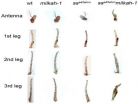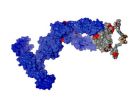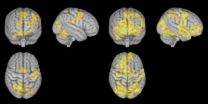(Press-News.org) Good news for Dads: Harvard researchers say the key to being a better parent is – literally – all in your head.
In a study in mice, Higgins Professor of Molecular and Cellular Biology and Howard Hughes Investigator Catherine Dulac have pinpointed galanin neurons in the brain's medial preoptic area (MPOA), that appear to regulate parental behavior. If similar neurons are at work in humans, it could offer clues to the treatment of conditions like post-partum depression. The study is described in a May 15 paper published in Nature.
"If you look across different animal species, there are some species in which the father contributes to caring for the young – sometimes the work is divided equally, sometimes the father does most of the work – and there are species in which the father does nothing," Dulac said. "The essential question is where is that variability coming from? We may be tempted to say that the mom has the neurons required to engage in parental behavior, and dads don't – this paper shows that's wrong."
It's long been known, Dulac said, that mice have highly stereotypical reactions to pups. Among sexually-experienced mice, both males and females care for pups by building nests, grooming and huddling with pups. Virgin females exhibit the same maternal behavior, while virgin males typically attack and kill pups.
Using genetic tools, graduate student Herbert Wu in collaboration with other researchers in Dulac's lab were able to activate galanin neurons in virgin males, and the results were startling.
Rather than attacking pups, the males immediately began to groom the pups. Other tests which killed the neurons resulted in parents that either ignored the pups altogether, or virgin females who behaved like males, and attacked the pups.
Dulac and colleagues began exploring the roots of parenting behavior after making an unusual observation in the lab – female mice which lacked a functioning vomeronasal organ, or VNO – olfactory neurons responsible for certain innate behavior – suddenly behaved nearly identical to male mice.
"We came to the conclusion that what the VNO was going in the female was repressing male-like behavior," Dulac said. "If there is a repression of that behavior in females…we wondered if there might be a parallel system – if there are neurons in males that might drive female-like behavior, which normally are repressed."
While the discovery of galanin neurons in the MPOA suggests the answer is yes, it also raised other questions – particularly why the neurons would be present in males if they aren't used.
What researchers found, Dulac said, is that those neurons, in fact, are used, but only after the male has mated, and they don't become fully active until three weeks – the exact gestation period of mice pups - after mating occurs.
"The dad won't kill the pups after three weeks, because they may very well be his own offspring," Dulac explained. "Even if you remove males immediately after mating and segregate them from females, it's very striking – half of them will behave paternally after three weeks. Simply mating seems to trigger some sort of clock, and that leads to paternal behavior."
Though it's not yet clear whether similar neural pathways exist in humans, researchers say galanin neurons are concentrated in a brain region responsible for many innate behaviors, such as feeding and sleep, and other neurons in the region have been shown to be conserved from mice across many mammal species, including humans.
"I would be extremely surprised if these neurons did not exist in humans," Dulac said. "What does that mean? It says that mothers can do it, and fathers can do it. What is really interesting, I think, is you now have an instinctive behavior – and a very important social behavior – and we have access to how it's being regulated."
Understanding how parental behavior is regulated, Dulac said, also opens the door to a greater understanding of how that behavior can break down, and potentially lead to conditions like post-partum depression.
"It is known that post-partum depression has a very close association with stress levels, particularly among first-time mothers," Dulac said. "One interesting hypothesis is that these galanin neurons in the MPOA have stress hormone receptors that can inhibit their function. These are the type of questions we can now address directly, because we know which neurons are controlling parental behavior."
Understanding how galanin neurons are connected to brain centers involved in motivation, stress and reward, how – and whether – genes associated with the neurons are expressed differently in males and females, what is happening in male brains in the three weeks after mating – all are questions that demand further study, Dulac said.
"Parental behavior is many things," Dulac said. "It's grooming, it's building a nest, it's protecting the pups – the male is able to do all of those. What this says is that in the male brain, they have the neurons to be paternal, but somehow those neurons are repressed. But we can now say, yes, dads can do it."
INFORMATION: END
Neural pathway to parenthood
Harvard researchers identify neurons that regulate parental behavior in both male and female mice
2014-05-15
ELSE PRESS RELEASES FROM THIS DATE:
Getting chemo first may help in rectal cancer
2014-05-15
PROVIDENCE, R.I. [Brown University] — First things first. If cancer patients are having trouble tolerating chemotherapy after chemoradiation and surgery, then try administering it beforehand. Reordering the regimen that way enabled all but six of 39 patients to undergo a full course of standard treatment for rectal cancer, according to research to be presented at the American Society for Clinical Oncology annual meeting in Chicago.
Studies have shown that only about 60 percent of rectal cancer patients comply with postoperative chemotherapy, said lead researcher Dr. Kimberly ...
MIPT experts reveal the secret of radiation vulnerability
2014-05-15
The scientists - Boris Kuzin, Ekaterina Nikitina, Roman Cherezov, Julia Vorontsova, Mikhail Slezinger, Olga Zatsepina, Olga Simonova, Grigori Enikolopov and Elena Savvateeva-Popova - studied Drosophila flies, in whose genome weak mutations of two different genes were combined. The paper is published in the PLoS One. They concluded that these mutations synergistically strengthen their mutual phenotypic expression. In other words, the aggregate effect of these mutations is much greater than that which can be produced by one of them individually.
The mutant flies bred by ...
MIPT scientists develop algorithm for anti-aging remedy search
2014-05-15
The scientists – Alexander Zhavoronkov, Anton Buzdin, Andrey Garazha, Nickolay Borisov and Alexey Moskalev– have based the new research on their previously-developed methods in the study of cancer cells. Each cell uses particular schemes of molecular interaction, which physiologists call intercellular signaling pathways.
A signaling pathway is a chain of sequential events of interaction between certain molecules which make the cell respond to stimulation. For example, hormone molecules first interact with the cell's membrane receptors, then the receptors engage with the ...
Next frontier: How can modern medicine help dying patients achieve a 'good' death?
2014-05-15
(TORONTO, Canada – May, 15, 2014) -- The overall quality of death of cancer patients who die in an urban Canadian setting with ready access to palliative care was found to be good to excellent in the large majority of cases, helping to dispel the myth that marked suffering at the end of life is inevitable.
"Fear of dying is something almost every patient with advanced cancer or other life-threatening illness faces, and helping them, to achieve a "good death" is an important goal of palliative care," says Dr. Sarah Hales, Coordinator of Psychiatry Services, Psychosocial ...
Study shows young men increasingly outnumber young women in rural Great Plains
2014-05-15
Lincoln, Neb., May 15, 2014 -- In many rural communities hard hit by decades of population declines, young men increasingly outnumber young women, a new study of Kansas and Nebraska census data shows.
In places with 800 or fewer residents, the proportion of young men increased by an average of nearly 40 percent as people went from their teens to their 20s.
Those findings suggest leaders should consider the needs of young women in their economic and community development plans, said Robert Shepard, a University of Nebraska-Lincoln doctoral candidate ...
Most NHL players peak by age 29: Study
2014-05-15
A new University of British Columbia study identifies when the clock runs out on an NHL player's peak performance, giving team executives insight into how best to build a roster.
The study by Sauder School of Business professor James Brander found that the performance of forwards peaks between the ages of 27 and 28. Defencemen are best between 28 and 29, and the performance of goaltenders varies little by age.
The forthcoming study to be published in the Journal of Quantitative Analysis in Sports also reveals that players performed close to their peak levels for a ...
Learning from sharks
2014-05-15
This news release is available in German.
Custom-tailored antibodies are regarded as promising weapons against a multitude of serious illnesses. Since they can accurately recognize specific structures on the surface of viruses, bacteria or cancer cells, they are already being deployed successfully in cancer diagnostics and therapy, as well as against numerous other diseases. The stability of the sensitive antibodies is a decisive factor in every step, from production and storage to therapeutic application.
A team of researchers headed by Dr. Matthias J. Feige and ...
Where have all the mitochondria gone?
2014-05-15
It's common knowledge that all organisms inherit their mitochondria – the cell's "power plants" – from their mothers. But what happens to all the father's mitochondria? Surprisingly, how – and why – paternal mitochondria are prevented from getting passed on to their offspring after fertilization is still shrouded in mystery; the only thing that's certain is that there must be a compelling reason, seeing as this phenomenon has been conserved throughout evolution.
Now, Dr. Eli Arama and a team in the Weizmann Institute's Molecular Genetics Department have discovered special ...
Sugar implicated in cardiovascular disease risk independent of weight gain
2014-05-15
Researchers from New Zealand's University of Otago have uncovered evidence that sugar has a direct effect on risk factors for heart disease, and is likely to impact on blood pressure, independent of weight gain.
Research Fellow with Otago's Department of Human Nutrition Dr Lisa Te Morenga, Professor Jim Mann and colleagues have conducted a review and meta-analysis of all international studies that compared the effects of higher versus lower added sugar consumption on blood pressure and lipids (blood fats or cholesterol) – both of which are important cardiovascular risk-factors.
They ...
This is your brain on meditation
2014-05-15
Mindfulness. Zen. Acem. Meditation drumming. Chakra. Buddhist and transcendental meditation. There are countless ways of meditating, but the purpose behind them all remains basically the same: more peace, less stress, better concentration, greater self-awareness and better processing of thoughts and feelings.
But which of these techniques should a poor stressed-out wretch choose? What does the research say? Very little – at least until now.
A team of researchers at the Norwegian University of Science and Technology (NTNU), the University of Oslo and the University ...
LAST 30 PRESS RELEASES:
Scientists show how to predict world’s deadly scorpion hotspots
ASU researchers to lead AAAS panel on water insecurity in the United States
ASU professor Anne Stone to present at AAAS Conference in Phoenix on ancient origins of modern disease
Proposals for exploring viruses and skin as the next experimental quantum frontiers share US$30,000 science award
ASU researchers showcase scalable tech solutions for older adults living alone with cognitive decline at AAAS 2026
Scientists identify smooth regional trends in fruit fly survival strategies
Antipathy toward snakes? Your parents likely talked you into that at an early age
Sylvester Cancer Tip Sheet for Feb. 2026
Online exposure to medical misinformation concentrated among older adults
Telehealth improves access to genetic services for adult survivors of childhood cancers
Outdated mortality benchmarks risk missing early signs of famine and delay recognizing mass starvation
Newly discovered bacterium converts carbon dioxide into chemicals using electricity
Flipping and reversing mini-proteins could improve disease treatment
Scientists reveal major hidden source of atmospheric nitrogen pollution in fragile lake basin
Biochar emerges as a powerful tool for soil carbon neutrality and climate mitigation
Tiny cell messengers show big promise for safer protein and gene delivery
AMS releases statement regarding the decision to rescind EPA’s 2009 Endangerment Finding
Parents’ alcohol and drug use influences their children’s consumption, research shows
Modular assembly of chiral nitrogen-bridged rings achieved by palladium-catalyzed diastereoselective and enantioselective cascade cyclization reactions
Promoting civic engagement
AMS Science Preview: Hurricane slowdown, school snow days
Deforestation in the Amazon raises the surface temperature by 3 °C during the dry season
Model more accurately maps the impact of frost on corn crops
How did humans develop sharp vision? Lab-grown retinas show likely answer
Sour grapes? Taste, experience of sour foods depends on individual consumer
At AAAS, professor Krystal Tsosie argues the future of science must be Indigenous-led
From the lab to the living room: Decoding Parkinson’s patients movements in the real world
Research advances in porous materials, as highlighted in the 2025 Nobel Prize in Chemistry
Sally C. Morton, executive vice president of ASU Knowledge Enterprise, presents a bold and practical framework for moving research from discovery to real-world impact
Biochemical parameters in patients with diabetic nephropathy versus individuals with diabetes alone, non-diabetic nephropathy, and healthy controls
[Press-News.org] Neural pathway to parenthoodHarvard researchers identify neurons that regulate parental behavior in both male and female mice




